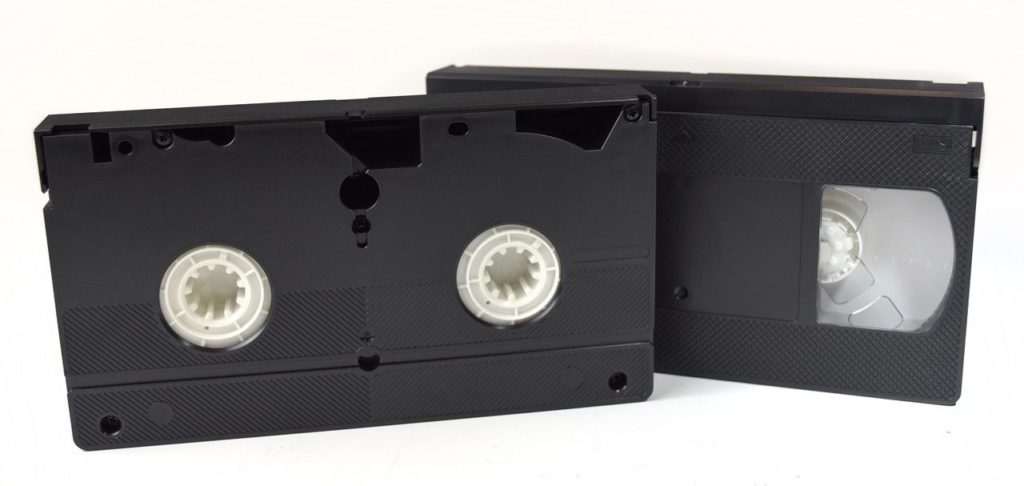
Until the early 2000s, Video Home System (VHS) was the de-facto standard for video. VHS cassettes can contain as much as 1,410 feet of tape, and by utilizing magnetic recording techniques, the format delivered relatively high recording quality at a consumer-friendly price point.
Of course, VHS has been largely replaced by DVD and other modern formats, and if you’re holding onto old cassettes, it’s time to upgrade. Even if your VHS cassettes show clear signs of damage, an experienced video conversion team may be able to help.
How long do VHS and Betamax tapes last in storage?
In perfect conditions, most VHS and Betamax tapes can be stored for up to 25 years before significant signal loss occurs. Of course, VHS technology has been practically obsolete for a decade, and most consumers don’t store their VHS cartridges in perfect conditions.
Your VHS tapes may become unreliable in storage for several reasons:
- Excessive heat and humidity can cause tapes to break down quickly.
- Tapes are magnetic, and can become demagnetized over time when stored next to speakers, audio/video players, and other magnetic equipment.
- Low-quality tapes typically use thinner materials, which may have a shorter lifespan.
- Regularly playing, fast-forwarding, or rewinding tapes can put stress on magnetic and mechanical components.
Most tape degradation begins gradually. You might notice unclear audio, shifting pictures, or excessive image “noise” (static) as the tape decays. However, these symptoms can also indicate problems with the playback equipment. In other words, tape conversion is always an option, even if you can identify clear signs of damage.
When should I consider professional tape conversion for VHS media?
Consider converting VHS and Betamax tapes to digital formats as soon as possible. Digital formats have numerous advantages over analog, and conversion is usually simple, straightforward, and affordable. Below, we’ll address some key reasons to convert analog video cassettes and film reels.
Older VHS tapes need to be converted to digital formats to be preserved.
As discussed above, most consumer-grade VHS tapes are nearing the end of their expected life cycle. Signal loss affects all VHS tapes regardless of manufacturer, tape length, or the original quality of the recording.
Extremely old VHS cassettes may use thinner tape, which can increase the chances of physical damage over time. By converting the cassette to digital formats, you’ll ensure that your films are accessible for years to come — and future-proofed, since digital video formats can be easily converted when necessary.
If your videos are important, you need a backup.
Even if your VHS cassettes were manufactured recently, we recommend keeping at least two backups of all important data. That certainly applies to treasured family videos; by keeping copies, you’ll safeguard your films against normal media degradation, but you’ll also be prepared for fires, floods, and other disasters.
Datarecovery.com recommends keeping one copy of important data offsite. When films have been converted to digital formats, they can be easily copied for storage in the cloud or on a physical storage device.
You’re not sure that your VHS cassettes are playable.
Don’t play VHS tapes before sending them out for conversion. VHS players feature an inclined drum head that spins at 1,500 or 1,800 rotations per minute (RPM), depending on format. Needless to say, this puts immense stress on tape and mechanical cassette components. Under normal conditions, this isn’t a problem, but older tapes may have degraded, increasing the chances of jamming or tearing.
Additionally, legacy VHS systems may be incapable of playing back video at the highest possible level of fidelity. Converting the video preserves the quality and reduces the chances of video loss.
Trust your VHS tapes to video conversion experts.
Datarecovery.com is a leader in media restoration and data recovery. With decades of experience, we’re committed to providing the best possible results for your project, and whether you’re converting a single family film or an entire archival library, our team is ready to help. We can minimize the risks involved in playing legacy media, read past damaged sections of your tapes, and recover media to the highest possible fidelity.
We offer conversion services for all film and video formats, and options are available for damaged or degraded media. To get started, fill out our online case form or call us at 1-800-237-4200.





